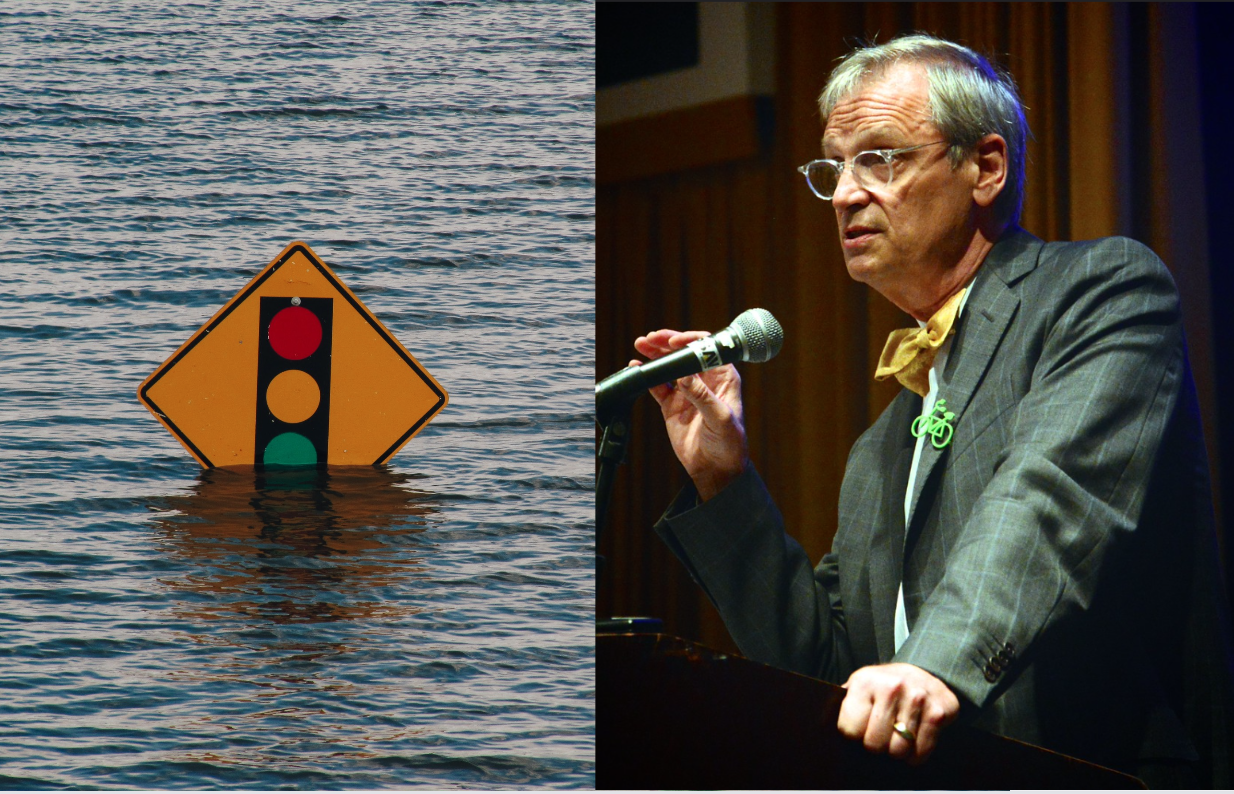A Republican majority in the House won't necessarily be a death knell for sustainable transportation priorities, a prominent Congressman says — and international pressure may be mounting for a divided Congress to come together and deliver policies to confront the role of American car dependency in the global climate crisis.
On a recent press call, Congressional Bike Caucus Chairman Rep. Earl Blumenauer (D-Ore.) set a cautiously optimistic tone about the future of the House, even as Americans await the result of a handful of races that could transfer control from his party to the GOP.
"If, for some reason, we lose the majority, it's only going to be by a handful of votes — two, three, four votes," Blumenauer said. "Nothing's going to be possible without some cooperation."
When it comes to climate action, the Portland-area believes that cooperation may be within reach. Blumenauer pointed out that the Congressional delegation to the 27th United Nation's Climate Change Conference of the Parties (COP 27) — of which he was a member — was joined by seven Republican represeantives, most of whom belong to the Conservative Climate Caucus. And he also noted that in the wake of a disappointing GOP midterms performance and ensuing discord with the party, there's no guarantee that the remaining GOP members will present a unified front against sustainability legislation.
"The Republicans have been, frankly, in disarray," said Blumenauer. "And some of my Republican friends who were there [at COP27] are not part of the head-in-the-sand caucus. … I think this [Congress] is different, and gives us some glimmer of hope, maybe even in the lame duck session."
The international community is certainly pressuring the U.S. to cut transportation-sector emissions to the levels set forth in the Paris Climate Accords — something that scientists say is not mathematically possible unless Americans drive significantly less than they do now, even if the domestic vehicle fleet is rapidly electrified (which it is not being). Blumenauer emphasized that the poor countries who suffer the most devastating impacts of climate change "have an iron-clad case that the rich countries can and should do more" to cut emissions – starting by making non-driving modes more accessible.
"[Mode shift], in many places, is not just low-hanging fruit. It's picking the fruit up off the ground," he said. "In the Infrastructure Investment and Jobs Act, we had $1 billion set aside for projects to promote alternative transportation, to prevent deaths on the highway, and to be able to broaden our efforts in shifting modes. ... This is an unprecedented sum, and it's just the beginning. It's not the final story here."
That story, though, may still pack some surprises – particularly if the GOP manages to rally behind its leadership in the years to come. The likely next House Speaker, Rep. Kevin McCarthy of California, holds just a 4-percent lifetime score on the League of Conservation Voters' environmental scorecard, and is reportedly weighing the possibility of scrapping the Select Committee on the Climate Crisis — or bogglingly, refocusing it around increasing America's oil and gas production. Many of McCarthy's Republican colleagues in the Senate, meanwhile, have remained stalwart in their opposition to the Biden administration's sustainable transportation priorities, which could help stonewall sustainable transportation wins out of the House if centrist Democrat senators fail to vote as a bloc with their more progressive colleagues.
Still, Blumenauer is hopeful that if the Democrats can overcome these obstacles, America's next chapter will be bright — including critical reforms to the U.S. tax code, which currently rewards some green modes over others. In addition to a buzzed-about bill that would expand federal electric vehicle tax credits to include e-bikes, which he co-sponsored, the Oregon rep was also the lead sponsor on legislation that would restore and expand the federal bicycle commuter benefit to reimburse workers for some of the expenses associated with their daily bike commutes, as well as a bill requiring employers to pay employees who forgo a company-provided parking space by not driving to work the cash equivalent of that parking perk.
"Being able to make [commuting choices] more flexible for American families is something that shouldn't be partisan," he added. "It also has the advantage that [the parking cash-out bill] will actually make money for the federal government — somewhere on the order of $20 billion over the next 10 years."
Even if that legislation doesn't advance, Blumenauer says the next Congress can still do a lot of good by putting the sustainable transportation provisions in the Infrastructure Investment and Jobs Act to their highest and best use — if the two parties can work together.
"The most important thing that we need to do is to mobilize forces to be able to implement those provisions," he added. "There's a lot of discretion for the administration, [and] there's a lot of opportunities for people around the country to be able to have access to resources for more equitable and low carbon infrastructure. But we have to actually make it happen."






